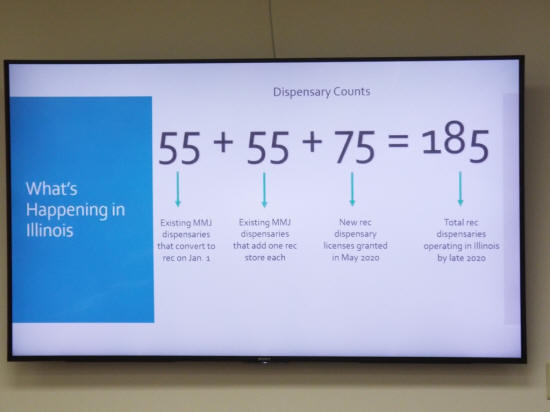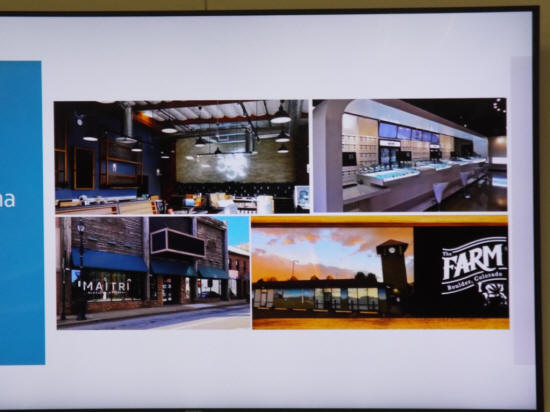|
Potential recreational marijuana
dispensary entrepreneurs approach city of Lincoln
Part one: Business developers request
support for retail establishment
 Send a link to a friend
Send a link to a friend
 [August 29, 2019] [August 29, 2019]
LINCOLN
On Tuesday evening, the Lincoln City Council convened at 6 p.m. The
one hour earlier than normal was in anticipation of a lengthier
evening to discuss the topic of recreational marijuana. They were
not wrong in that plan.
In a discussion that lasted for about half of the three-hour long
meeting, aldermen heard from and talked with Eli McVey and April
Glosser who would like to establish retail sale of recreational
marijuana in Lincoln.
Effective January 1, 2020, any and all adults may legally purchase
and consume marijuana for personal enjoyment via a state approved
retailer or dispensary.
Illinois has divided its 102 counties into blocks that allow three
recreational dispensaries in each block. Logan County is included in
the West Central Block.
Each party seeking to establish a dispensary is required to make
application to the state for a permit to operate a retail business.
Each dispensary is subject to a number of tax laws including a state
sales tax; and what is called a THC tax, which will add taxes based
on the amount of THS contained with the product being sold.
From Leafly.com -
THC, or tetrahydrocannabinol is the chemical compound in cannabis
responsible for a euphoric high.
In addition to state taxes, individual municipalities will be
permitted to impose a local sales tax of up to three percent on all
sales derived from the recreational dispensary.
Eli McVey is a Research Editor for MJBizDaily in Lakewood, Colorado.
He is originally from Atlanta, and said that among other reasons for
bringing a dispensary to Lincoln he is looking forward to coming
home and raising his children in Logan County.
April Glosser is the President and CEO of Thrive Market Intelligence
from Rochelle, Illinois. She is working with McVey to develop a
marketing plan for a retail business in Lincoln.

On Tuesday evening the two business representatives offered up a
presentation exploring the positive impact a recreational dispensary
would have on the community and asked the city’s approval to move
forward with their application.
The city is in control of the final outcome. Before the application
is filed the business owners must determine whether or not the city
would want a recreational dispensary in Lincoln.
The local government must pass an ordinance saying they do support
the dispensary and also state how much local tax they would assess
on the sale of recreational marijuana.
The city may also say that they do not want recreational marijuana
sold within the city limits.
If Lincoln turns down support for the business, then the would be
business owners would take their plan elsewhere within the block.
Lincoln is the first choice for McVey and Glosser, not only because
McVey is a Logan County native, but also because the business
entrepreneurs feel that from a marketing standpoint, Lincoln is a
hub location that will easily draw retail customers from other
portions of the West Central Block and beyond.
McVey has been observing the recreational trends in Colorado as that
state has offered such products for quite some time now. He said
that the state of Illinois is going to limit its dispensaries to 185
total, where in Colorado there are 560 dispensaries. He said that
even though Illinois is allowing recreational dispensaries, they are
doing so conservatively.
In his slide presentation, McVey broke down how dispensaries will
add up in Illinois. There are currently 55 dispensaries for medical
marijuana only. These require a doctor's prescription and the
patient must register with the state.

Prescription marijuana is tax exempt, but according to McVey the
cost of the actual product (medical marijuana) is very similar to
what the (recreational marijuana) product cost will be pre-tax at
recreational dispensaries.

The current 55 medical dispensaries will be permitted to convert to
medical/recreational effective January 1st. Each of these
dispensaries now in operation will be able to open a second
dispensary bringing the total medical/recreational dispensaries to
110.
In May of 2020, the state will issue licenses for an additional 75
recreational dispensaries, bringing the total dispensaries to 185.
Because there is no medical dispensary in Lincoln, the license McVey
will be applying for with the state will be for one of the
additional 75 recreational dispensaries to be issued in May.
[to top of second column] |

McVey also shared the benefits of bringing a dispensary to Lincoln.
He said first of all, recreational marijuana will be consumed in
Lincoln no matter what. If the dispensary is not local, the
consumers will go elsewhere to make their purchases.
If the city does allow the dispensary it will mean job creation for
local residents, an increase in the local economic activity, and it
will help control the black market.
It was noted that there will still be circumstances where that
marijuana is illegal in the state:
- If the product is purchased from an individual or ‘dealer’ and not
a state approved dispensary, that is considered a black market
purchase and is a criminal offense.
- Also if a person has more than their legal limit that is an
offense.
- And finally, the drug is supposed to be consumed only in the
customer’s home. It may not be used in public or while operating a
vehicle. If caught using in public or while driving, that is also an
offense.

In addition to benefitting the economy, McVey and Glosser explained
that with the legalization of the recreational dispensaries there
are strings attached.
Dispensary owners will be required by the state to participate in community
outreach programs. Glosser said this could be by doing fundraisers for local
charities such as a percentage of the day's sales going to a specific cause, or
employees might volunteer to participate in community activities.
And, finally, the obvious benefit to the community will be in tax revenues. With
the city permitted to claim up to three percent of the value of the product via
a local sales tax, the city could benefit substantially from the dispensary,
especially considering that it will be one of only three in the region, and one
of only 185 state wide.
McVey and Glosser said they envisioned Lincoln drawing in shoppers from a large
radius because of its central location and proximity to Interstate 55.
McVey said there were also myths or misunderstandings about marijuana that
needed to be cleared.
First he said marijuana is not addictive and is not a gateway drug. People do
not develop cravings for marijuana and those who use the product do not need
‘fixes.”
Those who use it also do not reach a point where they are not satisfied with the
drug and seek something stronger and perhaps more dangerous.
He said that marijuana overdose does not lead to death. People who consume
excessive amounts will not die from it, but they will become quite ill. He said
that most will experience severe pain, vomiting and paranoia. Their discomfort
will last six to eight hours, then it will be over.
McVey said that there is no evidence that legal marijuana increases crime rates
in a community.

Regarding teenage consumption, he said that teen consumption actually decreases
in legalized areas because the legal dispensaries drive the black market dealers
out of business.

McVey and Glosser also spoke about the retail establishments. They said that the
stores are modern, bringing in an attractive business that compliments the
community. He emphasized that they are not dark little back-alley shops with
deals being made under the table.
The business owners will be closely monitored by the state, and would be highly
motivated to follow the letter of the law regarding the sale of their product.
The businesses will also be high security with exterior lighting, alarms and
security personnel to assure the deterrence of theft, burglary or robbery.
Later in the evening, Mayor Seth Goodman would ask if the pair already has a
location in mind for its retail store.
Glosser said that choosing a location is part of the partnership it wants to
form with the city. They would join the city and other local businesses in
looking for a spot where the community can support the establishment of the
store, and where it will compliment other businesses in the vicinity.
McVey said that the floor plan would include 1,500 to 2,000 square feet and
would offer good parking options for its customers.
Before, during and after the presentation, there were plenty of comments and
questions from the audience and aldermen.
Part two of this series will address those comments and questions.
[Nila Smith]
 |